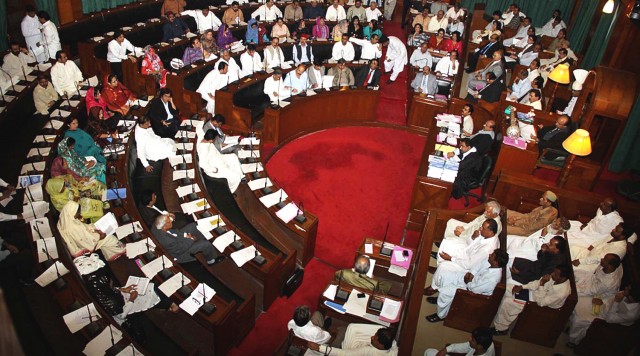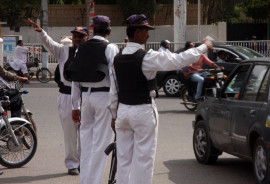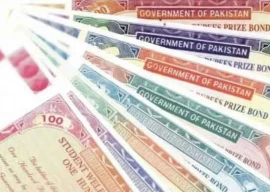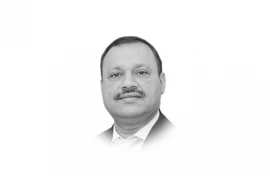
More than 80 of the province’s lawmakers had nothing to say in the Sindh Assembly’s third parliamentary year, which ended on April 4.
The progress report on the parliamentary year maintains that these MPAs, including some ministers and advisers, did not take “active part” in any of the sessions held - a polite way of saying they did nothing at all because even asking a question or raising a point of order qualifies as ‘progress’.
MPAs are supposed to be representatives of their areas who need to enact laws on issues of public interest and point the attention of the house towards important problems, however, most of them remained quiet the whole year.
Sindh Assembly Speaker Nisar Ahmed Khuhro presented the report on Thursday, which revealed that out of the 168 members, only a few were active when it came to making legislation and debating bills, resolutions, privilege and adjournment motions and asking questions from the ministries.
The top three position holders
The most vocal and prominent of the MPAs this parliamentary year included Arif Mustafa Jatoi of the National Peoples Party (NPP), Heer Ismail Soho of the Muttahida Qaumi Movement (MQM) and Humera Alwani of the Pakistan Peoples Party (PPP).
Jatoi asked 990 questions in the assembly sessions and moved 13 private bills, 15 resolutions, one privilege motion, nine adjournment motions and 53 motions on various topics of public interest. The MPA persisted with his bills and motions even though most of them were either turned down or simply lapsed into oblivion.
Meanwhile, Soho asked 993 questions and tabled 61 resolutions. One of these resolutions was adopted. She also submitted two private bills, one of which was turned down while the other is waiting for the government’s consent.
Alwani asked 551 questions, tabled one adjournment motion, 152 resolutions and 36 motions. Her success rate was similar to Jatoi’s and only one of her resolutions was adopted.
Ministers’ progress
When it came to the ministers, Dr Zulfiqar Ali Mirza and Sardar Ahmed came on top. Mirza moved a privilege motion while Ahmed, who is the MQM parliamentary leader and a minister without a portfolio, asked three questions.
Backbenchers
According to a report, the MPAs who did not take part in the legislation included Jam Ikramullah Dhareejo, Ahmed Ali Pitafi, Raheem Bux Bozdar, Mir Hassan Khoso, Mehboob Bijarani, Ghalib Domki, Abid Sundrani, Fasi Shah, Ghulam Qadir Chandio, Naeem Kharal, Aziz Jatoi, Imam Pitafi, Fida Dero and Sikander Shoro, Rukhsana Shah, Sanjeela Leghari, Sassui Palijo, Shazia Marri, Zubair Ahmed Khan, Abdul Haseeb, Adil Siddiqui, Khawaj Izharul Hassan, Muhammad Moin Khan, Khalid Bin Wilayat, Shoaib Bukhari, Muqeem Alam, Nisar Panhwar and Nadia Gabol.
Law Minister Ayaz Soomro had a successful run this year. Out of the 71 government bills moved by the law minister, 54 were passed. One of them was rejected by the governor while another eight are pending for his approval.
Around 46 acts have been passed by the assembly since April 4, 2008 to April 4, 2011.
The lawmakers moved around 100 joint resolutions.
The resolutions moved by individuals were turned down too often, which is indicated by the fact that out of 798, only 29 resolutions were passed from 2008 to the present.
None of the 23 private bills submitted were passed, however, six bills, four privilege motions, three resolutions and six motions were referred to standing committees for feedback.
Meanwhile, 23 government bills, 46 joint resolutions and 16 resolutions moved by MPAs in their individual capacity, were adopted by the house.
The progress report might not look too good but Khuhro seemed happy enough.
He said that while the earlier rulers had given little importance to legislation and indulged in ‘lota’ politics, the Sindh MPAs had attended the sessions with devotion and played their role in legislation. “The Sindh Assembly is the first assembly of Pakistan to set the precedent of publishing a progress report and briefing the media on its performance,” he said.
Earlier, the parliamentary year used to comprise 70 days, but after promulgating 18th Amendment, the provincial assembly has to complete 100 days. “We have completed 105 days,” he said.
The speaker said that there used to be 19 standing committees of Sindh Assembly, but the present government had increased the number to 37.
The secretary of the Sindh Assembly said that ministers are not allowed to ask questions or move privilege motion or an adjournment motion but they can pass resolutions.
Perks of being a lawmaker
Every MPA receives Rs40,000 as a salary per month.
They have an annual Rs40 million fund for development schemes (including the MPA priority programme)
They get a travel allowance of Rs30,000 each year
They get an unlimited medical allowance
A conveyance allowance of Rs3 per kilometre for every session attended by the MPAs. For instance, MPAs in Karachi receive Rs900 per day while the lawmakers belonging to other districts get around Rs1,500 to Rs2,000
Published in The Express Tribune, April 8th, 2011.























COMMENTS
Comments are moderated and generally will be posted if they are on-topic and not abusive.
For more information, please see our Comments FAQ